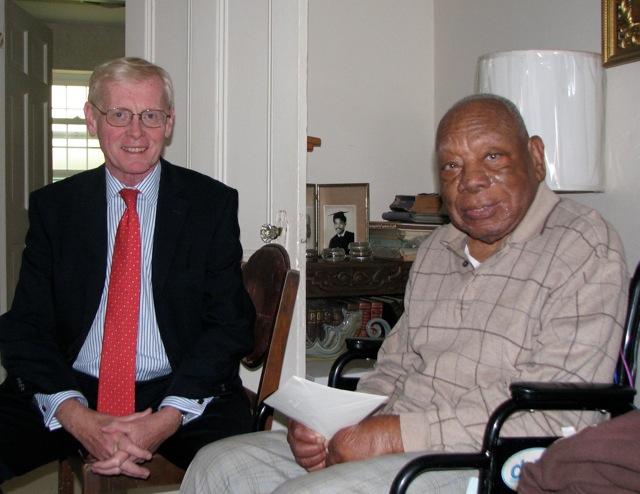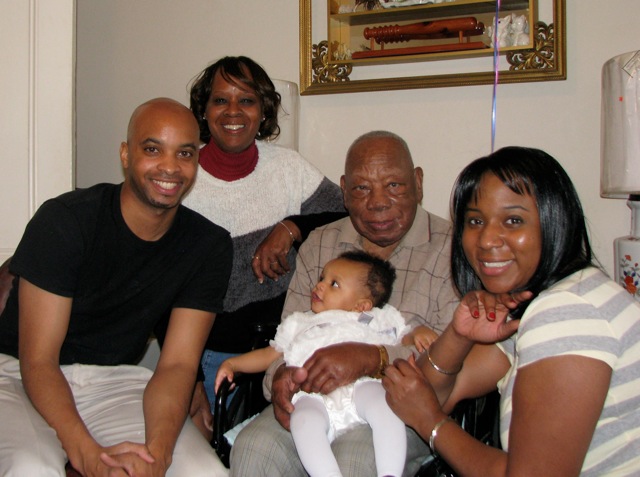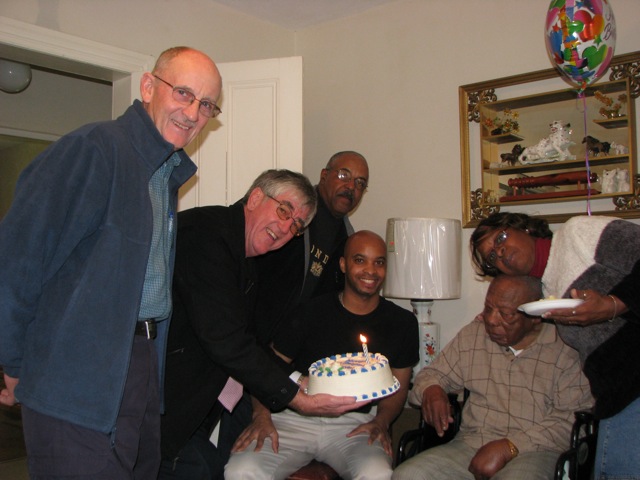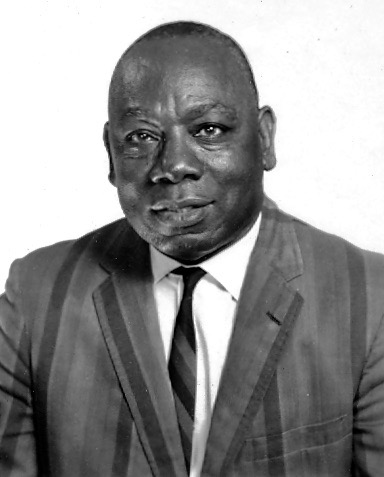 Detective Inspector Milton Murray Marsh
Detective Inspector Milton Murray MarshMilton Murray Marsh was born in Charlestown, Nevis, in the British West Indies on 17th February 1910. He was raised between Charlestown and Basseterre, St. Kitts, and his father, Arthur Alexander Marsh was a police officer, so perhaps law enforcement was in his blood. After leaving school Milton worked for a time in a hardware store in Basseterre and he then became Assistant to the Head Store Man in the Works Department (similar to the old PWD in Bermuda).
Milton's father eventually left Nevis and came to Bermuda where he took up employment with Public Works alongside a Mr. Nichols who Milton describes as a "tough old bird"! Mr. Nicholls was the time-keeper and his pet phrase was "When you're in you're in, and when you're halfway in you're neither in nor out"! Once he had established himself in Bermuda, Mr. Marsh Snr. brought his wife, Juliette, to the Island. She was also born in Nevis near the waterside and her family owned property there. Milton describes his mother as very religious, a regular churchgoer who tried hard in her own way to try to persuade her husband to join her!
As a young man in Nevis and St. Kitts, Milton loved to play sports - cricket and football - and proudly says that he had to learn early how to defend himself because some people wanted to take their revenge out on him because of his father's position as a policeman. As he says, "I had to take care of myself - the hard way".
Milton eventually decided to visit Bermuda and, it was more or less through his father that he was able to get a job as an Assistant in Public Works although he knew this was not what he wanted to do long term. His father introduced him to the idea of joining the Bermuda Police Force but he was reluctant to do so because of his past experiences as the son of a policeman in Nevis and St. Kitts.
Milton recalls that while working at Public Works at Dockyard he used to be taunted by a man named Hassell who said to him, "Your father sent you to high school and here you are chipping iron shit like me." Milton tried to shake off the comments but he knew he had to make a change and he got a new job working for a while at the Cooperative Society store on Boaz Island in Somerset.
Milton met his wife Gwendolyn (nee Williams) who was Bermudian, at Misick's Music School run by Miss Gladys Tatem. He had learned how to play the violin as a young boy in St. Kitts, and he wanted to continue with his interest in music. Their relationship blossomed and they were married on April 20, 1944 at St. John's Church in Pembroke. Gwendolyn was the daughter of Detective Sergeant J.J. Williams, who was himself an outstanding detective and worked alongside Bermuda's first ever Detective Officer, "D.O." Simons.
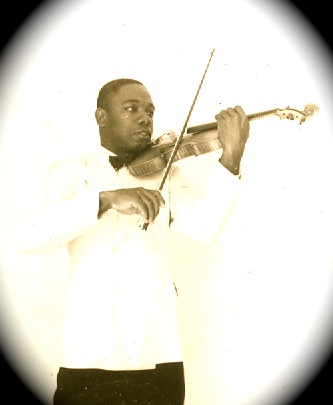
When asked about why he decided to join the Bermuda Police, Milton frankly admitted, "It seemed like the best of bad choices because jobs at that time were scarce, especially for negro people." His father did have some connections with the Commissioner of Police and also with senior police officers in Antigua, from where his father originated and had served in the Police Force.
Milton joined the Bermuda Police Force on the 30th June 1941, along with Harry Telford. When asked about how much training he received as a young recruit Milton quickly replied, "Next to nil." He was handed a worn out flashlight, a pair of handcuffs, and a truncheon, and he worked out of Hamilton Police Station which was then located on Parliament Street next to the Hamilton Jail. The Commissioner of Police at that time was Mr. McBeath, and one of Milton's early bosses was Percy Miller who, in Milton's words, "wasn't the most friendly or helpful person". One of Milton's worst memories was the appalling conditions at Hamilton Police Station cells which he described as "absolutely filthy".
Milton recalls being sent out to patrol the beat in Pembroke even though he hardly knew the area at all. The streets in those days were very poorly lit at night-time, and Milton says that because of his West Indian origin people would often refer to him as a "Jigger Foot." He recalls how one resident of Dock Hill would always be taunting him and boasting about how he owned a boat and several houses. Milton says the man got his comeuppance one time when he broke the law and Milton had to arrest him and take him to court where he was convicted and fined.
When asked about any other West Indian officers on the Force at that time or before he joined, Milton said there were very few, but there were a couple, including Bertie Denbrook and a man named Lashley who came from Barbados. When asked who might have been the first officer from the West Indies, Milton thought it was probably "Bo" Tucker.
He also says there were not many Bermudians on the Force when he first joined. It was mainly policemen from the U.K. Milton recalled working for a while under Vernon Jackson who he described as very talented, but as with other "coloured" officers, Vernon was not considered for promotion and eventually left the Force.
After working for several years out of Hamilton Police Station Milton was transferred to Western Division and worked out of Somerset Police Station at which time he lived at Ely's Harbour. He used to walk on foot to and from the Police Station, and sadly, he was subjected to the same treatment in Somerset as he had suffered in Hamilton. He vividly remembers making an arrest one day in Somerset and having a bunch of bystanders get involved, calling him "jigger foot "and making it clear they "didn't want a West Indian in Somerset". In fact he was quite badly beaten and still has a scar on his forehead from the attack. It was clear that Milton still remembers the names of several of his attackers who he says were from quite prominent cricketing families in Somerset. Several of his attackers were convicted and sent to jail, and Milton had to stay home for a while to recover from his injuries.
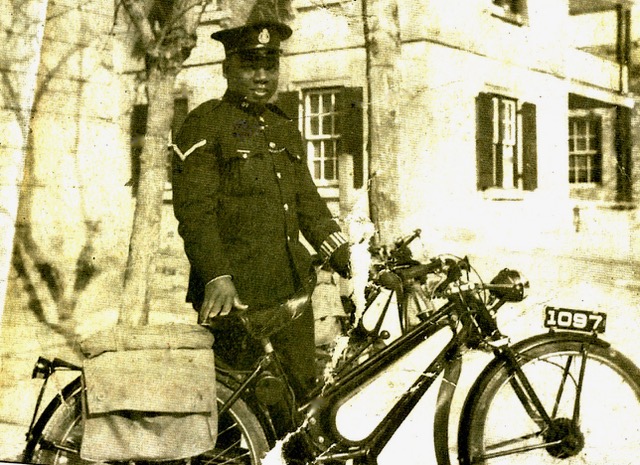 P.C. Milton Murray Marsh with one of our earliest police bikes
P.C. Milton Murray Marsh with one of our earliest police bikes
On a more positive note he fondly remembers the great Somerset detective duo of Mike (Cann) and Spike (Hazel) who were very good at their job and cleared up a lot of crime.
Milton was interested in working in CID and was promised the opportunity to do so. His opportunity came after he saw a man named Montgomery Williams illegally pedaling liquor at Victoria Park. Milton caught him red-handed even though Williams said to him, "Stupid fellow. You'll never catch me." The man went to court and was convicted, proving that Williams had greatly underestimated P.C. Marsh!
Milton was eventually transferred to CID even though he says Commissioner McBeath never really approved of him being there. He recalls that one time Mr. McBeath had him transferred back into uniform and replaced him with Joseph Nixon, but he was re-instated as a detective when Detective Inspector Oliver Trott said he wanted to take Milton onto his team.
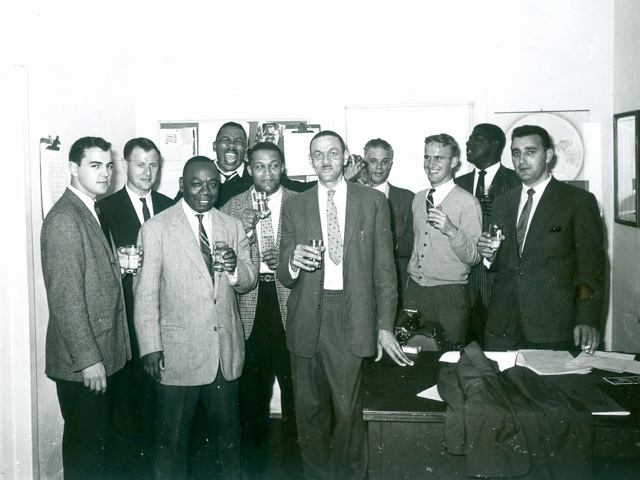
He recalls working for a while with "Bo" Swainson (the first person to score a century in Cup Match) who, he says, took credit for several cases that were actually cleared up by Milton. Milton said that one person he must give credit to was Winston "Super" Lottimore who knew everyone and would happily pass on useful information to him about people committing crime. He credits a lot of his success as a detective to "Super" who was also physically very strong and a very useful person to have around if there was any trouble.
Other detectives Milton worked with included "Happy" Duerden, who was popular with everyone in CID because of his personality, Dave Lunn, John Joe Sheehy, Leon Bean, Bryn Jones and John Mullan. He remarked that working in CID was strange because everybody was always scrambling for promotion.
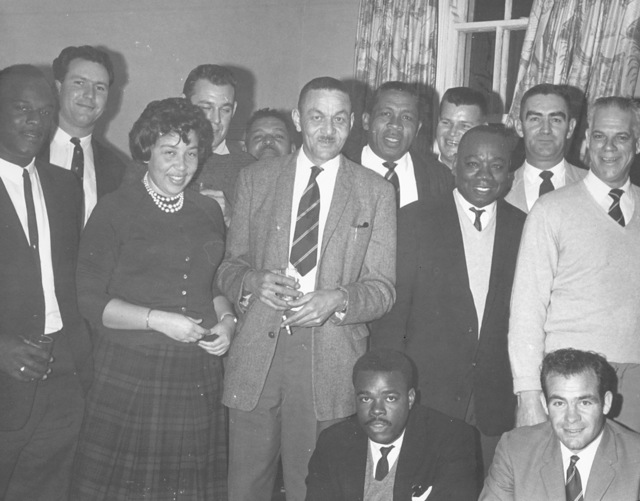
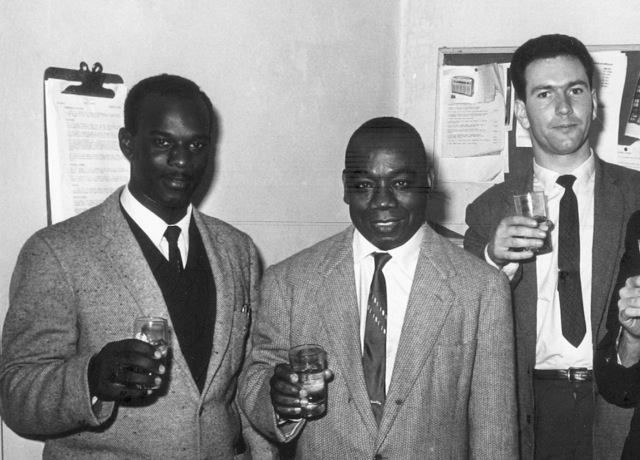
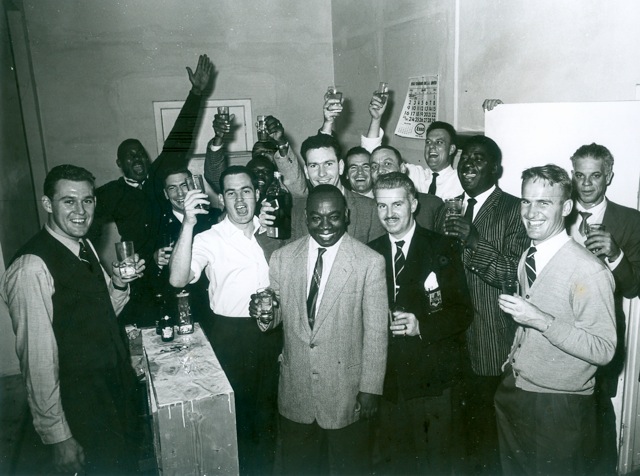
Overseas officers tended to have an advantage when it came to promotion because at that time they would be sent on overseas courses in the U.K. while taking vacation leave (which included round trip tickets to the U.K.). This was generally denied to locals but Milton was sent on an attachment to Scotland Yard and to the Liverpool Police where he studied files and how cases were put together. He points out though that he had to pay for his ticket to and from the U.K.
Milton recalls the Theatre boycott of 1959, at which time quite a few police officers, including himself, were paid overtime to stand outside the Island Theatre to maintain order, make sure people lined up in an orderly manner, and ensure that picketers couldn't physically interfere with those who wanted to enter the theatre.
During his service as a Detective, Milton received a total of seven Commissioner's Commendations for good work during investigations. He received his first two from Commissioner Henderson within a month of each other in early 1958 for the arrests of two youths for breaking into shops, and another man for shop-breaking in which Milton also recovered the stolen property. This was after he had been promoted to Detective Sergeant.
In 1959 he received another Commendation from Commissioner Henderson, and was also awarded the sum of Five pounds for his skill and tenacity in the investigation of a murder.
In 1961 Milton received two more Commendations from the new Commissioner, George H. Robins. The first was for zeal and attention to duty resulting in 8 persons being charged with stealing or receiving a considerable quantity of spirits (liquor), and the other for being a member of a team of CID officers who were responsible for a series of arrests clearing up various crimes.
His last two Commendations, also from Commissioner Robins, were awarded after his promotion to Detective Inspector; the first for obtaining valuable information which enabled the Police to prevent a serious case of arson and loss of life, and the second for "displaying persistence and keen observation" leading to the arrest and conviction of a man for stealing and "breaking out" of Masters Store in Hamilton.
It is clear that Milton was a very dedicated and resourceful police officer who greatly contributed to the efforts of the Bermuda Police Force in maintaining law and order throughout his service, and in particular during his service in CID.
In 1963, Detective Inspector Milton Murray Marsh was awarded the Colonial Police Medal for Meritorious Service by Her Majesty the Queen. It is worthy of note that in order to qualify for this medal at that time the awardee had to provide:-
"Valuable service characterized by resource and devotion to duty, including prolonged service marked by exceptional ability, merit and exemplary conduct."
Milton retired from the Force on 17th February 1964, at which time Commissioner George Robins noted that his conduct throughout his period of Service had been "Exemplary".
When asked about why he joined the Police Force, Milton commented, with a twinkle in his eye, "For financial convenience!" He paid particular tribute to the team he worked with as a Detective Inspector - Maurice "Syke" Smith, Sinclair Bean, Frederick "Penny" Bean, and Hubert Simmons who, he says, collectively did a great job in Central CID.
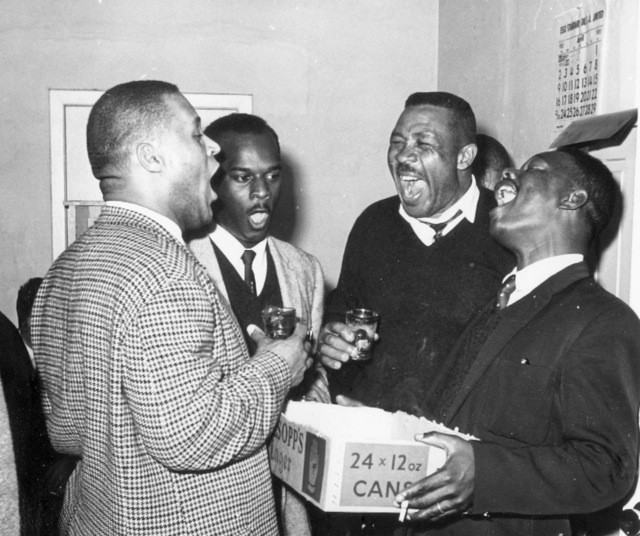
One of Milton's proudest possessions is a letter dated May 20th 1969 from then Commissioner of Police, George H. Robins, inviting him to become an Honorary Member of the Bermuda Police Officer's Mess.

Following his retirement from the Police Force, Milton worked for many years as both a bailiff for the Courts, and also as head of Hotel Security at the Castle Harbour Hotel. On June 24, 1966, he received a letter from the General Manager of Castle Harbour, Mr. George J. Stobie, thanking him for the splendid job he had done and was doing, and the readjustments he had made to their security system at the hotel.
Milton's wife, Gwendolyn, passed away in 1989 after a very long illness They had been happily married for 45 years, and had two children, Milton Marsh Junior and Blanche Elizabeth Atkinson. Milton has 10 grandchildren and 11 great-grandchildren. He still lives at his home on Serpentine Road with a little assistance from care workers.
This interview with retired Detective Inspector Milton Murray Marsh took place at his home on Serpentine Road in Pembroke over a period of several weeks in late 2010, when Mr. Marsh was 101 years of age. Although he had some difficulty remembering specific dates and some incidents, he still had a sharp wit and had no trouble recalling many details of his life in the Bermuda Police Force at a very difficult time in Bermuda's history when Mr. Marsh had two strikes against him; he was black and he was West Indian. I have done my utmost to write down his reminiscences just as he recounted them.
Roger J. Sherratt
Following completion of these interviews, Milton celebrated his 102nd birthday on 17th February 2011 at home with his family in attendance. During the day he was visited by the Commissioner of Police, Mr. Michael DeSilva, His Excellency the Governor, Sir Richard Gozney, and members of Bermie Ex-Po including Steve Taylor, Reese Bartley, Dave Cook, and Roger Sherratt. We were advised that Milton still has a sweet tooth so he was inundated with birthday cakes!
